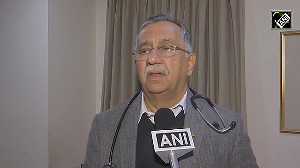Do you have wings on your feet? Are you happy to travel until your money runs out? You're a free spirit, but what if your job's not waiting when you come back?
Now, that should be a powerful incentive to economise on the stuff that doesn't matter, while still having a great trip.
Here are some nifty ideas to do just that:
Make a realistic budget
Based on the amount of money you'll need daily for food, hotels, car rentals, activities and miscellaneous purchases, make a realistic budget.
Budget a little extra for emergencies or for last minute shopping but do not, and I repeat do not, carry a whole lot of extra cash thinking you'll bring back what you don't need. You never will.
Prepay wherever you can
Do a quick research on the fares -- train, air, cabs, and hotels. Explore no-frills flights. Today, highly competitive no-frills airlines can get you from one city to another faster and cheaper than the train. Book the flights yourself by phone or online. Beware though: cheap airlines often do not provide even food, which can be a nuisance.
Prepay for train/air tickets, hotels and rental cars, and bring all receipts and confirmation numbers with you on your trip. This will not only help you avoid the last minute hair-tearing tension of not finding a seat on that train or ferry; or not getting the queen sized bed in the downtown area you wanted, but also allow you to avail of the best deals.
However, if you're willing to take a chance, sometimes airlines and hotels let out seats and rooms at the last moment at throwaway prices. In such cases it would be advisable not to pay too much in advance, but wait for a while and watch.
Use your debit card
Bring your debit card to use daily if you prefer to debit money out of your checking account, and bring two different types of credit cards, such as a Visa and a Master Card to use either daily or as backups. Double check the limit on your credit cards and the balance in your checking account before you leave.
Remember though, that credit cards are the greatest temptation that man has ever faced after the apple in the Garden of Eden. So if you must carry those credit cards with you, we'd advise you to put them in the locker and forget about them till you start packing to go back home!
If you are going to use your credit card, leave one credit card in the locker at the hotel. If you lose your wallet or purse, having a backup will save you a lot of time and hassle.
Prepaid travel cards
These are sort of like a custom debit card, where you load the card with money before your trip, then use it just as you would a normal credit or debit card. Examples are Visa Travel Money, Master Card Traveller's Cash cards etc . As with credit and debit cards, check the fees carefully, and always read the small print.
Carrying cash
It's always better not to carry too much cash with you. However, withdraw money from the ATM each day to have a little on you at all times. If you're traveling internationally, withdrawing cash from ATMs will give you a decent exchange rate.
But if you feel more secure carrying a lot of cash, then save yourself some transaction charges by making a few large withdrawals from the ATM rather than lots of small ones. Store the cash safely in your money belt.
Foreign currency
Go to your bank to exchange a small portion of your budgeted money into foreign currency if you're traveling internationally. Use this money for any expenses that you incur on your first day of travel, such as for cab fare or food. You can also exchange currency at your destination airport when you arrive.
Be a local
The trick to traveling cheap is to avoid cocooning yourself in a tour so you never have to interact with the locals.
Get friendly with the locals -- they can give you great tips on where to get good local food cheap, or where to shop and not get swindled. If you know the local lingo, use it. Nothing endears a person than to hear his own language from a stranger.
Don't go by the book
Focus on what is important to you and not what the guidebook says should be important - if you would rather go for a nature walk than go to the local museum why would you pay for an over-priced ticket to go there?
If food is important to you make that a focus of your trip, and skimp on the accommodation. You don't have to stay at a wonderfully luxurious hotel - have a meal there instead.
General advice
Getting change can be a challenge at restaurants and small shops, so break large notes whenever you get a chance. And while it doesn't happen often, paying with the smallest note possible at bars and restaurants will reduce your chance of not getting your full change back.
Have fun. If you're on a budget, stick to it, but don't stress. Come well prepared so that your wanderlust can be fulfilled unhindered by money concerns!






 © 2025 Rediff.com -
© 2025 Rediff.com -